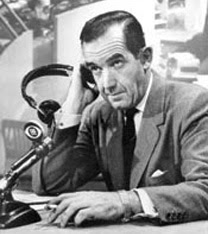 WWII set in and television was put on the back burner until 1948, a hallmark year for broadcasting. In what has been called "television's gold-rush" the FCC was forced to halt all licensing of television broadcast stations due to the high demand. Eventually the FCC would publish its "Sixth Report and Order" which by in large organized the airwaves.
WWII set in and television was put on the back burner until 1948, a hallmark year for broadcasting. In what has been called "television's gold-rush" the FCC was forced to halt all licensing of television broadcast stations due to the high demand. Eventually the FCC would publish its "Sixth Report and Order" which by in large organized the airwaves.However, not everyone was excited by television's sudden surge of popularity. For years radio had ruled the airwaves with news and entertainment. Personalities like Edward R. Murrow had reported on happenings in the European campaign of WWII via radio broadcast, and it had
 become THE source of information for families in the U.S. Television had changed all of that, and radio broadcasters were scrambling to find their place. No longer could they rely on dramas, variety shows, and quiz games to support themselves. What they were left with was hard news and music, and more specifically Rock music. The latter would prove to be radio's salvation.
become THE source of information for families in the U.S. Television had changed all of that, and radio broadcasters were scrambling to find their place. No longer could they rely on dramas, variety shows, and quiz games to support themselves. What they were left with was hard news and music, and more specifically Rock music. The latter would prove to be radio's salvation.Stations around the country began playing rock music 24 hours a day, 7 days a week, and people were listening. Folks like Allen Freed (of Cleveland, OH) became a household name. The rest of radio would follow suit, becoming "format based" or playing a certain genre of music all day. This practice continues to this very day. Radio had survived by adapting to the changing broadcast climate.
Similarly, the recording industry will need to adapt if it ever hopes to be financially successful.

In an open letter to the recording industry's big 4 companies (Universal Music Group, Sony BMG Music Entertainment, EMI Group, Warner Music Group) Apple Inc.'s CEO, Steve Jobs urged an abandoning of DRM protection schemes across the board. Unfortunately the RIAA (representing the big 4) fired a response that was almost non-sequitur in nature. They urged Jobs to license FairPlay (Apple's exclusive DRM) to third parties. The whole point was that DRM is broken and only punishes paying customers (read HURTS SALES!).
When will the recording industry get it? DRM doesn't work, and people will spend, and have spent their money elsewhere in order to have DRM free music online. What's worse it that others won't spend any money at all to have DRM free music. The fact is that DRM stomps all over the fair use rights of the American citizen. As Jobs pointed out, DRM is nothing but a hindrance to online music sales. When it comes to DRM, the audience isn't listening.
Even more disturbing than the crippling of music with DRM is the recording industry's absolute bull-headedness in relation to changing business models. Let's take a look at television again for a minute.
When was the last time you paid for content on your television? I don't mean premium services, I mean the network content itself. You don't. Television has been ad-driven for years, and last time I checked, the actors, directors, writers, were all being paid handsomely for their work.
The answer the recording industry is looking for is contained in the television network business model. They need to adapt to become an advertisement driven industry. The public is demanding reasonably priced, open content. Hence ad based revenue would be an ideal way to offset cost, or even profit in the current musical market.
What would this look like? Maybe a website where you can download a certain number of tracks a day after looking through some advertisements? Maybe sponsorships like we see in motorsports? The possibilities are endless, IF the recording industry opens its eyes, and realizes the world has moved on without it. Jobs is 100% accurate in his opinion of the music industry, and maybe, just maybe with his corporate clout, he can make something happen.

7 comments:
I think that's actually a good idea.
What about:
http://www.sellaband.com/
Cheers
Thanks anonymous,
I had never heard of Sellaband before you brought that up, but it is VERY intriguing. Everyone should take a look at that site. Basically you invest in bands you believe in, so they can record high quality albums etc. without the presence of a record label.
To put it in the words of Henry Ford, "They can have any color they want as long as its black." The RIAA and its member companies is all about CONTROL OF WHAT CHOICES THE PUBLIC HAS. It's not the business model of delivery they won't abandon, its the CONTROL of WHAT PRODUCT IS AVAILABLE; mainly, only theirs.
As long as you control what people listen to, what else do you think you can control? hmmm?
Dread
Thanks for the comment Dread, you definitely give us a bit to think about, and I think in some sense you are correct in your assertion that it is about control. However, the trend I've seen is that lots of folks who have listened to music for any period of time are looking to independent artists and labels for new content/music because they are sick of the big 4 companies churning out the same crappy music time after time. That being said, it looks as if the control the recording industry so desperately wants to hang on to is the very thing they will lose unless they change their ways.
Thanks Dave, so noted and updated.
Post a Comment